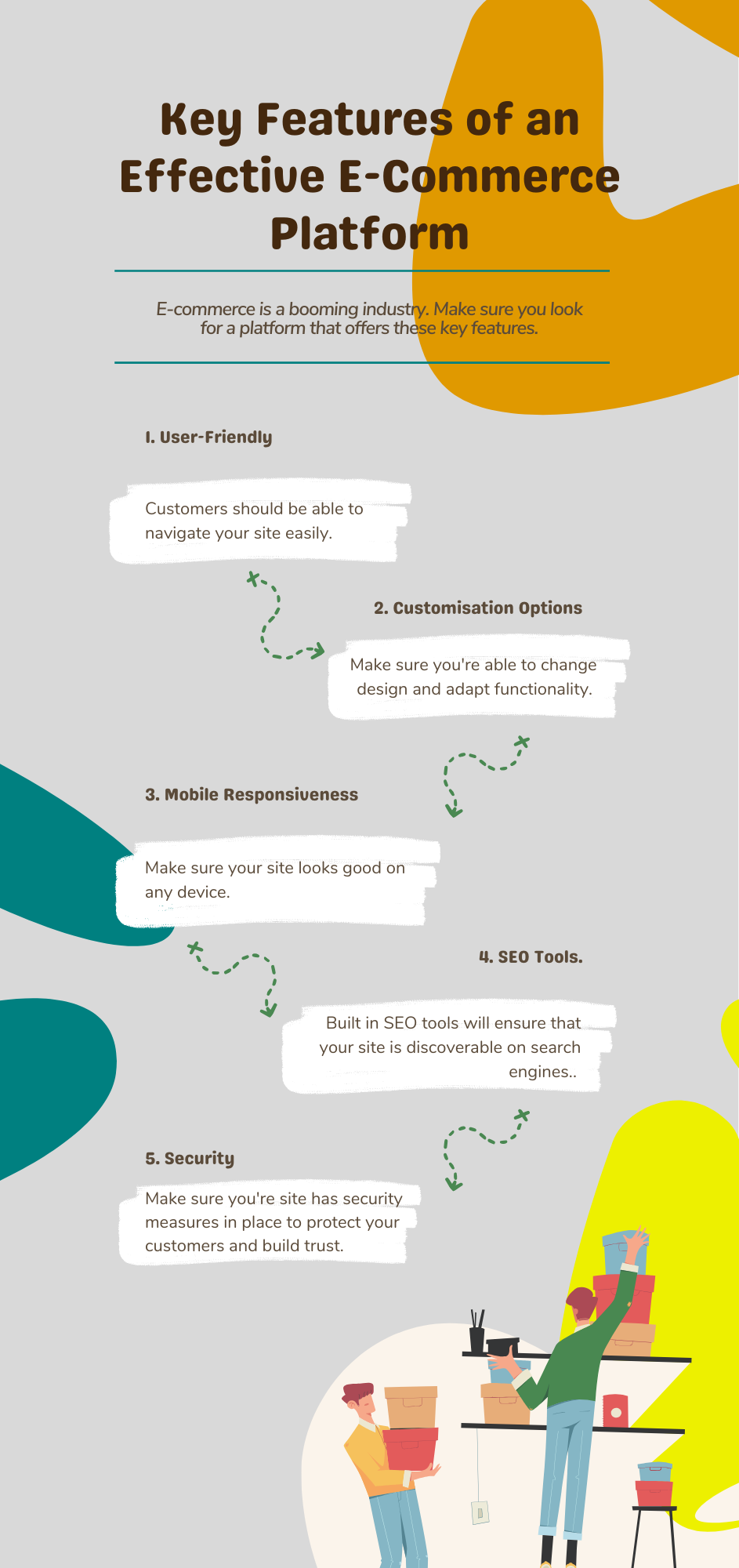
Selecting the best e-commerce platform is crucial for the success of your online business. With numerous options available, finding a platform that meets your specific needs can significantly impact your sales, customer experience, and overall business growth. This guide will help you navigate the key factors to consider when choosing the best e-commerce platform for your business.
Understanding Your Business Needs
Before diving into platform features, assess your business requirements. Consider the size of your inventory, target audience, budget, and technical expertise. Understanding these aspects will help you narrow down the platforms that best fit your business model.
- Inventory Size: Determine the size of your inventory. Platforms like Shopify and BigCommerce are great for small to medium-sized inventories, while Magento and WooCommerce can handle larger inventories. A small boutique might only need basic inventory management, while a large retailer may require advanced inventory tracking and integration with other systems.
- Target Audience: Understand the demographics and preferences of your target audience. This includes their shopping habits, preferred payment methods, and device usage. Choose a platform that offers the best user experience for them. For instance, if your audience prefers mobile shopping, ensure the platform offers strong mobile support.
- Technical Expertise: Assess your technical skills or the availability of a development team. Some platforms, like Shopify and Squarespace, are user-friendly and require minimal technical knowledge. Others, like Magento and WooCommerce, offer more flexibility but may require more technical expertise.
- Budget: Set a budget for your e-commerce platform, including setup costs, monthly fees, and transaction costs. Some platforms charge higher fees but offer more comprehensive features. It’s important to balance the cost with the benefits provided.
Key Features to Look For in an E-commerce Platform
When evaluating e-commerce platforms, prioritize features that align with your business goals. Key features to consider include:
- User-Friendly Interface: An intuitive admin dashboard makes managing your store easier.
- Customization Options: Look for platforms that allow you to customize your store’s appearance and functionality to match your brand. Customization is crucial for creating a unique shopping experience that aligns with your brand identity. Consider platforms that offer a wide range of themes and plugins.
- Mobile Responsiveness: Ensure the platform supports mobile-friendly designs to cater to the growing number of mobile shoppers. Mobile commerce is rapidly growing, and a platform that offers a seamless mobile shopping experience is essential. Look for responsive design capabilities and mobile-optimized templates.
- SEO Capabilities: Choose a platform with strong SEO tools to help your site rank higher in search engine results. Essential SEO features include customizable meta tags, clean URLs, sitemaps, and support for Google Analytics. Good SEO capabilities can significantly boost your online visibility and traffic.
- Security: Robust security measures protect your customers’ data and build trust.
- Payment Gateways: Verify that the platform supports multiple payment methods and secure transactions. Popular payment gateways include PayPal, Stripe, and Authorize.net. The availability of diverse payment options can enhance customer satisfaction and reduce cart abandonment rates.
- Integration with Other Tools: Check if the platform can integrate with your existing tools, such as CRM systems, email marketing software, and accounting software. Integration with third-party tools can streamline operations and improve efficiency. Popular integrations include MailChimp for email marketing and QuickBooks or Xero for accounting.
Popular E-commerce Platforms and Their Strengths
Several e-commerce platforms stand out due to their robust features and user-friendly interfaces. Here’s a look at some of the most popular options:
- Shopify: Known for its ease of use and extensive app store, Shopify is ideal for small to medium-sized businesses. It offers a range of themes, powerful SEO tools, and reliable customer support.
- BigCommerce: BigCommerce offers robust built-in features and scalability, making it suitable for growing businesses. It supports multiple sales channels, including social media and marketplaces.
- WooCommerce: A flexible, open-source platform that integrates seamlessly with WordPress, ideal for businesses with technical expertise. WooCommerce is highly customizable and supports a wide range of plugins. It’s free to use, but you may incur costs for hosting and premium extensions.
- Magento: Highly customizable and scalable, Magento is perfect for large businesses with complex needs. It offers advanced features, extensive customization options, and powerful SEO capabilities. Magento’s open-source version is free, but enterprise solutions can be costly.
- Squarespace: Best for creative businesses and those looking for beautiful design templates with e-commerce functionality. Squarespace offers an intuitive interface, integrated blogging, and excellent design options.
Cost Considerations for E-commerce Platforms
It’s essential to consider not just the upfront costs but the total cost of ownership over time. This includes monthly fees, transaction fees, hosting costs, and costs for additional features or plugins.
- Subscription Fees: Evaluate the subscription plans offered by each platform. Make sure to understand what each tier includes and whether it meets your business needs.
- Transaction Fees: Some platforms charge transaction fees on top of payment processing fees. Consider how these fees will impact your profit margins.
- Additional Costs: Account for costs related to themes, plugins, and any custom development work. Some platforms have a large ecosystem of paid add-ons that can enhance functionality but increase costs.
Importance of Customer Support and Resources
Reliable customer support and a strong user community can be invaluable when running an online store. Ensure the platform offers robust support options and has an active community for additional assistance.
- Customer Support: Look for platforms with 24/7 support via chat, phone, or email. Good customer support can help resolve issues quickly and keep your store running smoothly.
- Community Forums: An active user community can provide helpful tips and troubleshooting advice. Community forums are a great place to find solutions to common problems and share experiences with other users.
- Documentation and Tutorials: Check if the platform offers comprehensive guides and tutorials to help you get started. Well-documented platforms with extensive resources can make the learning curve less steep.
Review Security Features
Security is a critical aspect of any e-commerce platform. Ensure the platform you choose offers robust security features to protect your customers’ data and your business operations.
- SSL Certificates: SSL (Secure Sockets Layer) certificates encrypt data transmitted between your website and your customers, ensuring secure transactions. Most platforms offer free SSL certificates as part of their package.
- PCI Compliance: The platform should be PCI (Payment Card Industry) compliant, ensuring it adheres to security standards for processing credit card payments.
- Data Protection: Look for features that protect against data breaches and unauthorized access. This includes regular security updates and backups.
Evaluate Scalability
Consider the long-term growth of your business. Choose a platform that can scale with your business as it grows, accommodating increased traffic, product listings, and transactions.
- Performance: Ensure the platform can handle high traffic volumes without compromising performance. This includes fast loading times and reliable uptime.
- Flexibility: Look for platforms that offer flexible plans or features that can be upgraded as your business needs change. This might include advanced inventory management, marketing tools, or analytics.
- Global Reach: If you plan to expand internationally, choose a platform that supports multiple languages, currencies, and shipping options.
Consider Hiring a Development Team
While choosing the right e-commerce platform is important, having an experienced development team can be equally crucial. A professional team can customize the platform to your specific needs, integrate third-party tools, and ensure that your online store is optimized for performance and security.
- Custom Development: A development team can create custom features and integrations that are not available out of the box, providing a unique shopping experience.
- Ongoing Support: Professional developers can offer ongoing support and maintenance, ensuring that your site remains up-to-date with the latest security patches and features.
- Expert Guidance: Experienced developers can guide you through the selection process, helping you choose the best platform based on your specific needs and goals.

How to Conduct Effective Keyword Research
Recent ArticlesIn the realm of digital marketing, effective keyword research is the cornerstone of a successful SEO strategy. It involves identifying the terms and phrases your target audience uses to search for information related to your business, products, or...

Top SEO Strategies for Small Businesses
Keyword research is the first step in any successful SEO strategy. It involves identifying the terms and phrases that potential customers are using to search for your products or services. Tools like Google Keyword Planner, SEMrush, and Ahrefs can help you...

What is SEO and Why is it Important for Your Business?
SEO, or Search Engine Optimization, is the practice of enhancing your website to improve its visibility on search engines like Google. This increased visibility can lead to more traffic, higher conversion rates, and ultimately, greater success for your business....

Why Responsive Web Design is Crucial for Your Website
In today’s digital era, having a responsive web design is not just an option but a necessity. With the increasing use of mobile devices to access the internet, businesses must ensure their websites are mobile-friendly to provide a seamless user experience across all...

Top 10 Features Every Business Website Should Have in 2024
In 2024, having a well-designed and functional website is more important than ever for businesses of all sizes. A website is often the first point of contact between a business and potential customers, making it crucial to leave a lasting impression. This guide...

“
Need help choosing the best e-commerce platform for your business?
Contact us today for personalized advice and a free consultation.

Not sure if this is for you?
Related Articles
Why Integrating Secure Payment Gateways is Crucial for Your E-commerce Business
In the competitive world of e-commerce, providing a secure and seamless payment experience is essential for building customer trust and increasing conversion rates. Integrating secure payment gateways ensures that transactions are protected, and customers feel...


